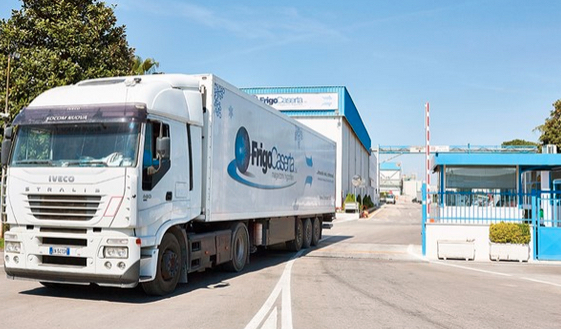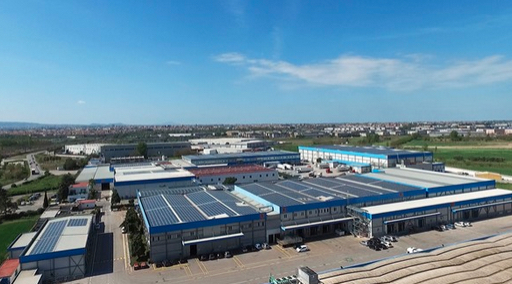Gricignano d’Aversa, Italy: Last month, CubeCold Europe acquired Frigocaserta, a southern Italian temperature-controlled warehousing company. Domenico Razzano, managing director, Frigocaserta taks about the company’s background and future plans as part of CubeCold.
“I entered this business in 2008 without any prior knowledge of it,” Razzano said. “I joined as an accountant. I became the chief financial officer because there wasn’t one at the time. During my role in accounting, I saw the need for management accounting analysis. I started analysing costs and revenue to understand the margins for each line of business. By autonomously implementing this management accounting approach, I realised that I really enjoyed this sector.”
Frigocaserta’s 30-plus years of operation have seen considerable changes and challenges, including technological advances, market expansion, and shifts in consumer demands. “We should always understand that there’s room for improvement, and we should never take anything for granted.” Razzano said.
When FrigoCaserta set up in the 1980s, the frozen food industry was completely different from what it is today, and the business was quite straightforward – storing raw materials for clients for next year’s production, but as customer demands grew, so did Frigocaserta. Today, Frigocaserta has a 78,000 pallets capacity, including 25,000 pallets in a newly built semi-automated temperature-controlled cold store, Razzano said. The turning point occurred in the mid-1990s when the number of frozen seafood importers operating in the port of Napoli grew significantly. By the end of this period, Frigocaserta expanded its services to the retail sector and began functioning as a transit hub between supermarkets and retailers, he said.
Local partners
Over the years Frigocaserta worked primarily with national companies, yet collaboration with local manufacturers has also contributed to its growth. Among them producers of a regional specialty – buffalo mozzarella. “Buffalo mozzarella began to gain popularity not only locally but also nationally and became a staple in large retail companies’ offerings,” Razzano said.

“As a result, we engaged in this sector by storing the raw material, milk, which was frozen and used by companies when the market demanded higher production, typically during the summer.” By the end of the 2000s, Frigocaserta had reached a saturation point.
However, Paolo Sanzillo, the majority shareholder and sole administrator, saw further growth potential in the market. With the support of neighbouring companies and a steady cash flow, Frigocaserta decided to take the risk and invest in 12,000 additional pallet spaces.
“When I joined the company, I quickly realized that there was room for growth in the seafood sector,” Razzano said. “In a short period of three to four years, the extra 12,000 pallet spaces were almost entirely used. To be accurate, we had about 40,000 spaces before the new investment in 2008. With the new investment, we increased to around 50,000 pallet spaces. The company consistently had high capacity levels.”
When one of their customers, Dolciaria Acquaviva asked them to manage all their storage and distribution, Frigocaserta accepted the challenge. “At first, this new partnership faced some obstacles. With a big increase in size of daily operations, issues may arise with the employees, as well as with our software systems, which led to misplaced products and a lot of confusion.”
“However, we at Frigocaserta, were determined to make things work,” recalls Domenico. “We put in extra hours, often working late into the night and on weekends, with our IT team and project managers to fix the issues. We knew we had to solve these problems quickly and show Dolciaria Acquaviva that they could rely on us.”
This hard work paid off and in six weeks Frigocaserta fixed the issues and proved that they could handle the challenge. This experience strengthened their relationship with Dolciaria Acquaviva and, today, they are one of Frigocaserta’s best clients.
First automated warehouse
In early 2020, Frigocaserta recognised the need for additional space and specialised areas to accommodate the types of services they offered. This prompted serious consideration towards an automated warehouse. Despite lacking experience in building automated warehouses, Frigocaserta embraced the challenge once again. The new automated warehouse was completed and launched in May 2023.

“To maximize the capacity level of this warehouse, we continued to bring in new customers,” Razzano said.
“Their goods were relocated to external warehouses that we rented, which required substantial financial efforts. However, this prepared us to reap the benefits of the automated warehouse once it was operational.”
“We’ve been operating the automated warehouse for approximately four to five months now. We haven’t quantified the potential savings as it’s an ongoing process. However, we’ve already filled over 50% of the capacity, confirming the sector’s growth.”
Cube Cold Europe
Now that Frigocaserta is part of the CubeCold platform, the company is looking forward to embracing all the opportunities this partnership brings he said. “We are pleased to join a larger platform where there are different visions and different growth opportunities, not just from an economic perspective but also in terms of organizational structure and mindset,” Razzano said.
“To achieve certain goals, you can’t stay on your own; you can’t remain in a fragmented market. You have to act as a national and European player and provide your customers with a different vision.”
“Italy is an important market in the temperature-controlled storage sector. Today, goods are exchanged with Central, Northern, and Southern Europe. Our medium to long-term vision is to play a key part in developing a network within the Italian market, seeking specialized companies in certain sectors that can provide CubeCold with a unique presence in the market for specific types of services.
“When you’re almost unique in the market, it’s meaningful. When you have a large market share, added values, and good profitability, you can also initiate further developments, including greenfield projects.
“I anticipate that our scale, not just as Frigocaserta, but as a group in Italy, will expand and will gain greater recognition in the market,” Razzano said.







